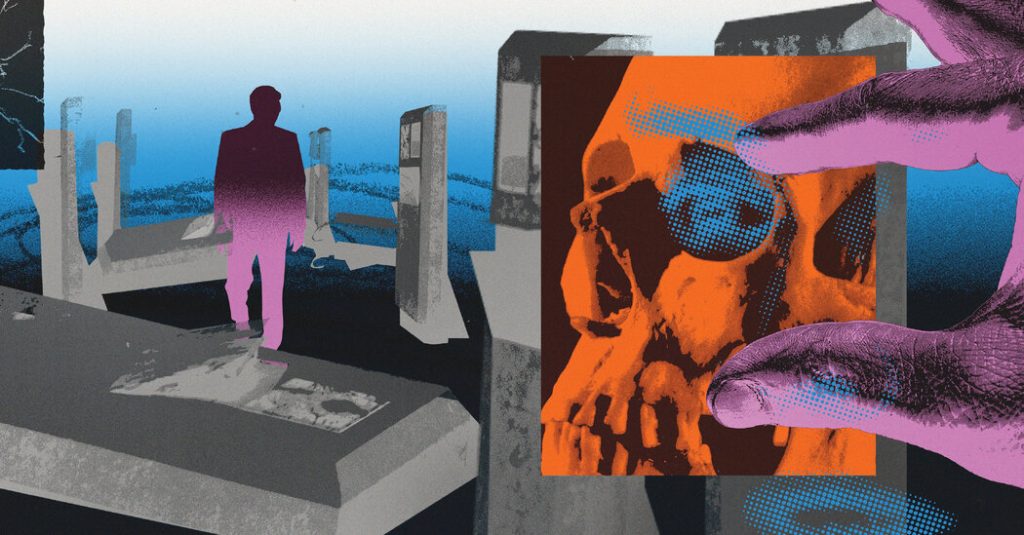In David Cronenberg’s newest film, “The Shrouds,” a widower named Karsh Relikh, played by Vincent Cassell, takes a woman on a blind date to his dead wife’s grave. They stop in front of her tombstone — a double plot, with empty space for Karsh to occupy in the future — and pay their respects in a very Cronenbergian way. On a screen on the headstone is a real-time image of his wife’s body, decaying in its grave, captured by the high-tech metallic “shroud” she was buried in; it is also transmitted to a smartphone app that allows Karsh to zoom and rotate the image at will. This technology allows people to remain connected to their loved ones by watching their bodies disintegrate, like a mash-up of the Buddhist corpse meditation and a mindfulness app. “I can see what’s happening to her,” Karsh says, enraptured, as his date squirms in discomfort. “I’m in the grave with her. I’m involved with her body the way I was in life, only even more.”
You know what you are about to be shown: a body in some state of decay. But as the screen traces the desiccated shape of Karsh’s wife, Becca, with tender slowness, the effect is still irrationally startling. Death has rendered Becca’s elegant features down to an anonymized skull. Even so, there is someone on the screen whom Karsh recognizes and responds to at the deepest emotional level. You feel disgust, of course, but also a secondhand intimacy. What’s shocking is not the rotting body but the affection with which it is viewed, a tenderness that allows you to continue looking. You are not encountering death in the abstract, impersonal and horrific: You are seeing it anew, through the devoted gaze of the lover who has been left behind.
These days there is nothing so shocking about seeing gruesome things on film. Horror movies are now mainstream, and it’s common for at least a few of the biggest releases at any given megaplex to offer some kind of grisly fright. Violence is also more common than ever on the screens of our laptops and phones, where social media catalogs accidents, bombings and dead children with eerie nonchalance. Despite all this, Cronenberg’s films remain difficult to digest. They are full of disconcerting bodily transgressions, rooted in aberrant desire. They get under the skin, repulsing even viewers accustomed to the usual Hollywood blood and gore. His last film, “Crimes of the Future,” from 2022, prompted one dissatisfied reviewer to write that it “should be renamed crimes against humanity.”
Perhaps this is because of the way Cronenberg’s movies tend to relish the things that are most terrifying to the audience. Other horror films share the viewer’s repugnance, even reinforce it; only Cronenberg asks you to imagine what it would be like to be erotically transfixed by a car crash (as in “Crash”) or by tenderly performing ornamental surgeries on your partner (as in “Crimes of the Future”). His films invite you into a morality that does not yet exist, hinting at the possibility that the values and norms of your world could be supplanted someday. In a recent interview, he pointed out that we already possess the technical know-how to make something like his fictional death shrouds: “It’s an imagined technology probably nobody really wants, but I’m saying: What if somebody did want it?” Rather than dwelling in the horror of transgression, his interest is in what lies beyond — in transgression’s intimate life.


